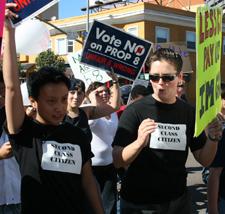At least 120,000 gays, lesbians and allies poured into the streets in 300 cities across the US and around the world Nov 15, to protest the passage of California’s Proposition 8, which rolled back gay marriage rights, Nov 4.
The protests built on a week and a half of demonstrations in California, Seattle, New York and other cities, after California voters passed a ballot initiative rescinding gay marriage rights in that state during the presidential election.
In Vancouver, close to 100 supporters gathered in solidarity at the Art Gallery.
“In Canada I’ll be damned if I get to the back of the bus,” Carl Meadows told the crowd, his husband by his side. “And I’ll be damned if I’m going to sit here and be silent and let my American brothers and sisters accept having to be at the back of the bus because somebody put minority rights to the general voting public.”
Proposition 8 passed by a margin of 52.4 to 47.6 percent of votes to amend California’s state constitution to override the May 2008 state Supreme Court decision that legalized same-sex marriage.
California had been one of only three states in the US to legalize gay marriage, along with Massachusetts and Connecticut. Now the legal status of the 18,000 couples already married in California is uncertain.
Vancouver protest organizer, Roger Chin, says he organized the local rally to support the US queer community and out of fear that human rights violations won’t stop with Proposition 8.
“We are a global village,” he warns. “What happens in one part of the world affects us all.”
“What happens in the United States really affects us in Canada,” agrees Kristen Catton, who joined the rally with her partner, Shelley Cox, in support of her friends who were recently married in California.
“We’re the same group and we deserve to have the right to have freedoms like everyone else,” she adds.
“People shouldn’t have to be forced to decide [between] living close to relatives in the United States or living in a place where they can legally marry the person they love,” says Luis Grisales who moved from the US with his partner, Richard Dalton, to get married in Canada on Jul 4. “On American Independence day, we experienced true independence,” he says.
Amy Balliet launched the Join the Impact website that sparked the activism that led to the cross-country and international Proposition 8 protests. “I needed to do something,” she says. “This was a way to take the power back.”
She, too, compares the Proposition 8 protests to the next generation of Stonewall.
“It’s amazing, the community is banding together in a way they’ve never done before. It’s amazing to be a part of such a positive experience,” she says.
Voters in Florida and Arizona also voted to ban same-sex marriage, but the California vote is the only one that rolls back rights already in place.
“You don’t vote on people’s rights,” says Little Sister’s co-owner Jim Deva. “They are taking minority rights and putting them toward majority vote. Minority rights have to be protected from the tyranny of the majority.”
Immediately after the ballots were counted, lawyers for the gay side filed suit in the California Supreme Court to try to stop Proposition 8 from taking effect. They argue that the proposition did not seek a simple constitutional amendment, but rather a constitutional revision, which would require a two-thirds vote of the legislature to reach the ballot. The court has yet to hear their case.
Exit polls from Nov 4 suggest that age, race, religion and political affiliation all had an impact on Proposition 8. African-American voters were among the highest demographic to support the proposition to re-ban gay marriage, as were Republican voters and voters over the age of 65. In contrast, voters under 30 were the strongest to support gay marriage and oppose Proposition 8.
Alec Clayton, president of Parents, Families and Friends of Lesbians and Gays [PFLAG] in Olympia, Washington points out that the Mormon Church was the biggest backer of Proposition 8. “The vote came from religious people across the board,” he says.
The Church of Jesus Christ of Latter-Day Saints in Utah declined a telephone interview; instead spokespeople directed Xtra West to a press release on their website.
“Marriage between a man and a woman is ordained of God, and the formation of families is central to the Creator’s plan for His children,” reads the statement.
A broad-based coalition of churches and other organizations placed the proposed amendment on the ballot, the statement adds. “The Church will participate with this coalition in seeking its passage.”
Xtra West’s attempts to contact the Protect Marriage: Yes on Proposition 8 Campaign were unsuccessful by press time.

 Why you can trust Xtra
Why you can trust Xtra


